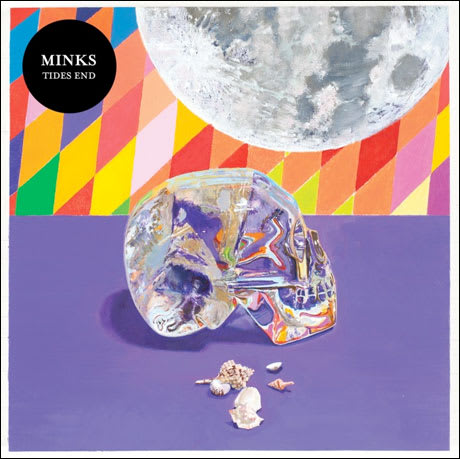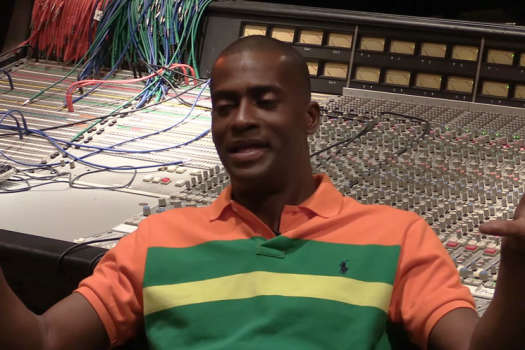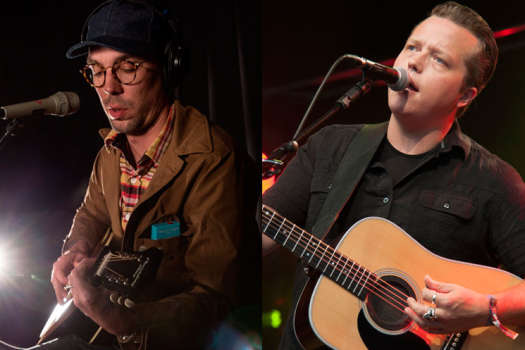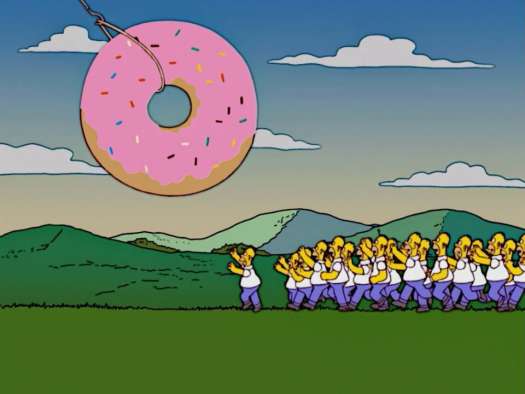When a new band named Minks appeared in April 2010 with a seven-inch for emerging Brooklyn label Captured Tracks, there was considerable talk about who exactly this disconsolate post-punk was. Turns out it was a guy named Shaun "Sonny" Kilfoyle, who didn't feel the need for all the exposure. With the help of some friends, Minks became more of a collective, and released a debut, By the Hedges, in 2011, which aligned the band with C.T.'s growing crop of buzz bands.
But that lifestyle didn't really work for Kilfoyle. Retreating to Long Island, he sought isolation from the bustling New York music community, deciding to go it alone for a second Minks album. Hiring like-minded producer Mark Verbos cured his nasty case of writer's block, as the two fleshed out ideas that resulted in Tides End, a much warmer spin on his '80s post-punk/new wave-leaning sound. Taking inspiration from visual artists like Warhol, Pollock and de Kooning, the music of Seal, Simply Red, Enigma and early Chicago house music and a derelict beach-front estate that gave its name to the album's title, Tides End marks a rebirth for Kilfoyle.
Exclaim! spoke with Sonny over the phone to discuss his move away from the big city, the differences between his two albums, why pop music is so fraudulent and how he doesn't exactly fit in with the rest of the Captured Tracks roster.
What are you up to at the moment?
Washing my car and drinking a beer.
What kind of car do you drive?
I have a 1975 Dodge Dart and a 1959 American Rambler. When I lived in New York, we had the Dart. In New York you don't need a car. But when I moved out of New York last fall, I thought it was time to get a second car.
How is it moving away from New York to Long Island, when you're part of a music scene?
My opinion of the music scene in New York is that it appears more like a scene to an outsider. It's really big, there are so many small scenes within it all. But I've never felt like I was part of a scene. I guess for me it was easy because of that. It doesn't feel very different living out here other than that it's rural. Whereas the city is quite nuts.
I've interviewed a number of acts on Captured Tracks and the way they've all spoken about the label makes it seem like the artists are part of a tight-knit family. Do you consider yourself a part of that?
Well, I guess there's a common thread among the bands. But no, I wouldn't consider myself a part of it. As far as friends go, I don't think that I have friendships with anybody on the label. I mean, I know them and I see them at shows. I'd say I'm friendly with them, but we don't hang out. I've just never been a part of any scene.
You've said that it was Captured Tracks that approached you to release music, which is kind of the opposite to how it works. What were you planning on doing instead of music?
I don't really know. I would have made an album or some music regardless of whether Captured Tracks wanted to put it out or not. It's just what I do as a human. I've been playing music for almost 20 years. Sure the first five of them I could play less than two chords. But if you do it a lot, it starts to become your outlet for frustration, or you find something to be inspired by. I think ten or 12 years ago it just started to be part of the cycle of my life.
Minks has always been you being helped out by friends. What other members are in the band right now?
It is me, mostly. I did this past album with the help of a producer/engineer, so he's the only collaborator on Tides End. My brother played on one of the tracks. But I was the songwriter, but then working with Mark [Verbos] as a producer helped turn my vision into the finished product I wanted it to be.
What is it about Mark Verbos that made you want to record with him?
He has a good sense of humour. Mark, like me, is like the anti-musician musician. He's in his own realm. He takes what he does seriously, and I respect that. I like to work with people who are also perfectionists and really have a passion for what they do. And he did. But I think his technical ability I responded to more than anything because I've tried to work with people in the past and it took me a long time to start rolling. I think that is because I have a hard time working with people. Maybe because it's that I'm difficult to work with, I haven't figured that out yet. He was the only person I found that could work as quick as I could think. And that's why I guess it worked.
If someone had played me your new album without saying who it was, I might not have guessed it was Minks. How do you feel about that?
Would you have preferred a second By the Hedge?
As much as I enjoyed that first album, I'd say no. This was a pleasant surprise, I mean.
I guess what it is, is that I felt inspired to challenge myself. On Captured Tracks, I felt that everything was sounding the same — and this is just my opinion — but as a music listener I was bored. I felt like no one was trying to write catchy music. I don't know, I just wanted to write great pop songs. I would listen to radio pop while I was driving, and I just wanted to see if I could blend a pop structure with something that was cooler than what I was hearing on the radio. It was a challenge. I definitely wouldn't have had fun writing a second By the Hedge. But I don't even think I could have because you go through different states of mind, experiences and moods, and you can only capture that once. You then have to draw from a different set of experience and mood.
Tides End definitely sounds like a lighter record than By the Hedge.
It's definitely less depressing. I think lyrically I wanted to write about contemporary things, rather than the past. Or write about things that seemed more relevant. Whereas on By the Hedge it didn't seem like I was writing to be relevant at all. I was just kind of… whatever came out, came out. That was a pretty dark record because I was in a dark period of my life when I recorded it. I don't even remember half of those recording sessions because I was either too drunk or too out of my head on something. But for this record I was a lot clearer, so maybe the music is a lot clearer.
So, how did seeing crowd violence at sporting events help with your writing?
It was a book I read about ten years ago called Among the Thugs by Bill Buford. And it was basically a journalistic essay on UK soccer crowd violence. But really "Playboys of the Western World" was really about the thrill of being in the moment of one of these rushes where before a soccer, football, whatever, where you feel the adrenaline of knowing you'll get into a fight with the opposing fans before the game. So that's the reference.
The KLF's Manual was mentioned in the press release. What role did that play in the making of the album?
Well, I don't know if it helped me... Okay, I'll lay on the line my opinion of music. I think that it's okay to talk about music, like any artist can streamline bullshit on what a song or a painting is really about or what you're trying to convey or feeling. But 90 percent of the people that I know just write whatever. They'll decide to tell you what it's about after they've written it. I like the idea of the KLF's Manual because it tells you how to put it together. It's basically telling you not to take music serious, that it's a joke, right? That if you follow this guideline you're sure to have a #1 single. Everything I love in the book is like, "Do nothing for the next six hours. Have a cup of tea. Wait for the phone to ring..." It basically illustrates how much of a joke it is to a lot of musicians. But it's easy to pretend that it's so much more serious after the fact. I think that there's so much bullshit going on. People are trying to make phony art, but really it's just music. The KLF is basically saying it's not that complicated, it's not that serious, you don't have to be an artist to do it. You just have to have rhythm and speak to the masses. That's what it's really about. They don't care if it's artistic or not. If it feels good, if you can dance to it, if it speaks to them, that's all you need. That kind of makes sense, right? I'm not gonna name names, but I just listen to some music, and there's a whole game you can choose to play if you want. But I'm not gonna say you shouldn't do that. Music's music and it's for listening to. You can tell me in 5,000 words what this song is about, but the reality is they were probably half-drunk, wrote it in five minutes then recorded it. Unless you're Pulp, or someone who's crafting these amazing songs with great lyrics. Pulp is such a great band. Not a lot of people do what they do anymore.
But that lifestyle didn't really work for Kilfoyle. Retreating to Long Island, he sought isolation from the bustling New York music community, deciding to go it alone for a second Minks album. Hiring like-minded producer Mark Verbos cured his nasty case of writer's block, as the two fleshed out ideas that resulted in Tides End, a much warmer spin on his '80s post-punk/new wave-leaning sound. Taking inspiration from visual artists like Warhol, Pollock and de Kooning, the music of Seal, Simply Red, Enigma and early Chicago house music and a derelict beach-front estate that gave its name to the album's title, Tides End marks a rebirth for Kilfoyle.
Exclaim! spoke with Sonny over the phone to discuss his move away from the big city, the differences between his two albums, why pop music is so fraudulent and how he doesn't exactly fit in with the rest of the Captured Tracks roster.
What are you up to at the moment?
Washing my car and drinking a beer.
What kind of car do you drive?
I have a 1975 Dodge Dart and a 1959 American Rambler. When I lived in New York, we had the Dart. In New York you don't need a car. But when I moved out of New York last fall, I thought it was time to get a second car.
How is it moving away from New York to Long Island, when you're part of a music scene?
My opinion of the music scene in New York is that it appears more like a scene to an outsider. It's really big, there are so many small scenes within it all. But I've never felt like I was part of a scene. I guess for me it was easy because of that. It doesn't feel very different living out here other than that it's rural. Whereas the city is quite nuts.
I've interviewed a number of acts on Captured Tracks and the way they've all spoken about the label makes it seem like the artists are part of a tight-knit family. Do you consider yourself a part of that?
Well, I guess there's a common thread among the bands. But no, I wouldn't consider myself a part of it. As far as friends go, I don't think that I have friendships with anybody on the label. I mean, I know them and I see them at shows. I'd say I'm friendly with them, but we don't hang out. I've just never been a part of any scene.
You've said that it was Captured Tracks that approached you to release music, which is kind of the opposite to how it works. What were you planning on doing instead of music?
I don't really know. I would have made an album or some music regardless of whether Captured Tracks wanted to put it out or not. It's just what I do as a human. I've been playing music for almost 20 years. Sure the first five of them I could play less than two chords. But if you do it a lot, it starts to become your outlet for frustration, or you find something to be inspired by. I think ten or 12 years ago it just started to be part of the cycle of my life.
Minks has always been you being helped out by friends. What other members are in the band right now?
It is me, mostly. I did this past album with the help of a producer/engineer, so he's the only collaborator on Tides End. My brother played on one of the tracks. But I was the songwriter, but then working with Mark [Verbos] as a producer helped turn my vision into the finished product I wanted it to be.
What is it about Mark Verbos that made you want to record with him?
He has a good sense of humour. Mark, like me, is like the anti-musician musician. He's in his own realm. He takes what he does seriously, and I respect that. I like to work with people who are also perfectionists and really have a passion for what they do. And he did. But I think his technical ability I responded to more than anything because I've tried to work with people in the past and it took me a long time to start rolling. I think that is because I have a hard time working with people. Maybe because it's that I'm difficult to work with, I haven't figured that out yet. He was the only person I found that could work as quick as I could think. And that's why I guess it worked.
If someone had played me your new album without saying who it was, I might not have guessed it was Minks. How do you feel about that?
Would you have preferred a second By the Hedge?
As much as I enjoyed that first album, I'd say no. This was a pleasant surprise, I mean.
I guess what it is, is that I felt inspired to challenge myself. On Captured Tracks, I felt that everything was sounding the same — and this is just my opinion — but as a music listener I was bored. I felt like no one was trying to write catchy music. I don't know, I just wanted to write great pop songs. I would listen to radio pop while I was driving, and I just wanted to see if I could blend a pop structure with something that was cooler than what I was hearing on the radio. It was a challenge. I definitely wouldn't have had fun writing a second By the Hedge. But I don't even think I could have because you go through different states of mind, experiences and moods, and you can only capture that once. You then have to draw from a different set of experience and mood.
Tides End definitely sounds like a lighter record than By the Hedge.
It's definitely less depressing. I think lyrically I wanted to write about contemporary things, rather than the past. Or write about things that seemed more relevant. Whereas on By the Hedge it didn't seem like I was writing to be relevant at all. I was just kind of… whatever came out, came out. That was a pretty dark record because I was in a dark period of my life when I recorded it. I don't even remember half of those recording sessions because I was either too drunk or too out of my head on something. But for this record I was a lot clearer, so maybe the music is a lot clearer.
So, how did seeing crowd violence at sporting events help with your writing?
It was a book I read about ten years ago called Among the Thugs by Bill Buford. And it was basically a journalistic essay on UK soccer crowd violence. But really "Playboys of the Western World" was really about the thrill of being in the moment of one of these rushes where before a soccer, football, whatever, where you feel the adrenaline of knowing you'll get into a fight with the opposing fans before the game. So that's the reference.
The KLF's Manual was mentioned in the press release. What role did that play in the making of the album?
Well, I don't know if it helped me... Okay, I'll lay on the line my opinion of music. I think that it's okay to talk about music, like any artist can streamline bullshit on what a song or a painting is really about or what you're trying to convey or feeling. But 90 percent of the people that I know just write whatever. They'll decide to tell you what it's about after they've written it. I like the idea of the KLF's Manual because it tells you how to put it together. It's basically telling you not to take music serious, that it's a joke, right? That if you follow this guideline you're sure to have a #1 single. Everything I love in the book is like, "Do nothing for the next six hours. Have a cup of tea. Wait for the phone to ring..." It basically illustrates how much of a joke it is to a lot of musicians. But it's easy to pretend that it's so much more serious after the fact. I think that there's so much bullshit going on. People are trying to make phony art, but really it's just music. The KLF is basically saying it's not that complicated, it's not that serious, you don't have to be an artist to do it. You just have to have rhythm and speak to the masses. That's what it's really about. They don't care if it's artistic or not. If it feels good, if you can dance to it, if it speaks to them, that's all you need. That kind of makes sense, right? I'm not gonna name names, but I just listen to some music, and there's a whole game you can choose to play if you want. But I'm not gonna say you shouldn't do that. Music's music and it's for listening to. You can tell me in 5,000 words what this song is about, but the reality is they were probably half-drunk, wrote it in five minutes then recorded it. Unless you're Pulp, or someone who's crafting these amazing songs with great lyrics. Pulp is such a great band. Not a lot of people do what they do anymore.




